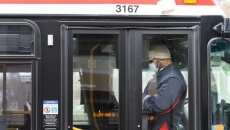VICTORIA - Deficits are in the forecast for British Columbia’s budget, but that’s not stopping the New Democrat government from spending billions on health, housing and families.
Finance Minister Katrine Conroy said the government plans to invest in people during uncertain times, despite a deficit projection of $4.2 billion in 2023-2024, and $11 billion over three years.
“When times are tough, that’s exactly when you need someone in your corner,” she said in her budget speech to the legislature Tuesday.
Join Katrine Conroy, Minister of Finance as she delivers the 2023 BC Budget. https://t.co/ABj4RBvOPF
— BC Government News (@BCGovNews) February 28, 2023
The projected deficits follow an unexpected surplus in 2022-2023. The windfall, originally forecast at almost $6 billion, has been pared back to $3.6 billion after Premier David Eby’s government spent much of it on affordability, infrastructure and public safety initiatives.
Conroy defended the government’s plan to post consecutive deficits, saying B.C.’s economy is strong, and the government must help people.
“We’ve proven during the pandemic that we can incur deficits by supporting people,” she said in a news conference. “It’s just not the right time to start making cuts. It’s not the right time to start asking people to pay out of their own pockets for services they expect to get.”
B.C. Business Council spokesman Ken Peacock said the government’s budget appears to be written with a “scatter gun.”
He said the council doesn’t support the large deficits, saying they cause inflation and crowd out investment.
“They are spending right across the board,” he said. “It’s just too loose.”
Economic growth in B.C. is forecast to slow from 2.8 per cent in 2022 to 0.4 per cent this year, before rising to 1.5 per cent in 2024.
B.C.’s total debt is forecast to increase to 107.9 billion next year from $93.4 billion this year.
Conroy said the government will spend $6.4 billion more on health care over the next three years, including more than$1 billion to expand mental health and addiction services, said Conroy.
“Mental health is health and we’re making the largest investment in mental health and addiction services in B.C.’s history,” she said in her speech. “Our focus will be on expanding supports across the spectrum of care for people struggling with addiction. We’ll do this by expanding the number of treatment and recovery beds.”
Conroy said the government intends to make mental health and addictions services a seamless model of care that transitions from detox to treatment to aftercare.
Since 2016, when B.C. first declared a public health emergency, more than 11,000people have died of illicit drug toxicity and overdoses.
The budget also delivers on previous NDP government promises to provide free prescription contraception for B.C. residents and tax credits for renters.
The NDP made a $400 renter’s rebate a campaign promise in 2017. The new budget includes an income-tested tax credit of up to $400 that will apply to 80 per cent of rental households in B.C., starting in 2024, said Conroy.
The government will increase income and disability assistance payments, expand existing school meal programs and raise family benefit payments by 10 per cent in July as part of $4.5 billion in family support efforts in times of rising inflation, she said.
About 75 per cent of B.C. families with children are eligible for the family benefit and single parents can receive an additional $500 annually, on top of the 10 per cent boost, said Conroy.
“For families who feel like they are just getting by, and never getting ahead, we’re here for you,” she said. “Now, parents will receive up to $1,750 for the first child, $1,100 for the second and $900 for the third.”
People on income and disability assistance will see their shelter rate increase by $125 a month starting in July, said Conroy, who added that it’s the first shelter rate increase since 2007 and will help about 160,000 people, including 33,000 children.
The budget also includes supports for the government’s “refreshed” housing plan with $4.2 billion over three years to build more homes for renters, middle-income families, Indigenous people and students, she said.
“We’ll clear the way for more housing with zoning changes and a faster permitting process,” Conroy said. “And we’ll make major new investments to increase housing and services near public transit hubs around the province. Our plan will also help ease pressure on local rental markets by building thousands more student housing spaces.”
In 2017, when the NDP was first elected it introduced a 10-year plan to build 114,000 homes.
B.C.’s carbon tax will increase $15 per tonne annually until it hits $170 in 2030, while climate action tax credits will be expanded, with a four-person family receiving a maximum of $900 a year, up from $500.
VICTORIA - Here are highlights of the 2023 British Columbia budget presented Tuesday. All costs are over three years, unless otherwise stated:
$6.4 billion in new health spending, including $2.6 billion for health services such as cancer care, $1.1 billion to attract and retain family doctors, and more than $1 billion for mental health and addictions services. There’s also $875 million in 2023-2024 for COVID-19 measures.
$4.2 billion in new housing funding, including $1.7 billion to build more homes, $575 million for student housing, and more than $1.5 billion to reduce homelessness with modular homes and other measures.
Economic growth is forecast to fall from 2.8 per cent in 2022 to 0.4 per cent in 2023, before climbing to 1.5 per cent in 2024 and 2.4 per cent in 2025.
The 2022-2023 surplus is projected to be $3.6 billion. A series of deficits are then forecast: $4.2 billion in 2023-2024, $3.8 billion in 2024-2025, and $3 billion in 2025-2026.
$317 millionfor policing and BC Corrections, including the repeat offender program and a new special investigations and targeted enforcement program. A further $80 million is set to boost access to justice while $65 million is aimed at other public safety initiatives.
$119 million for free prescription contraception, starting April 1, making B.C. the first jurisdiction in Canada to provide free birth control.
$558 million to increase financial supports for recipients of income and disability assistance.
10 per cent increase in B.C. Family Benefit payments from July 2023, with single parents receiving a further boost of up to $500 per year.
The B.C. carbon tax will increase $15 per tonne each year until reaching $170 in 2030.
Climate action tax credits will be expanded, with a four-person family receiving a maximum of $900 a year, up from $500.
PUBLIC'S REACTION REGARDING THE BUDGET VICTORIA -
The British Columbia government released a budget Tuesday that promises billions in new spending on health, housing and cost-of-living supports, as well as a return to deficits.
Here’s what people are saying about the plan:
“Some believe we should respond to uncertainty by pulling back. By making cuts that reduce services. Or by making people pay out of pocket for tolls and private health care. That’s not what British Columbians want.” — B.C. Finance Minister Katrine Conroy.
“This budget supports the expansion of health workforce training, an additional 9.25 million hours in staffing (and) significant wage increases … these initiatives are critical to addressing workload and burnout.” — Hospital Employees’ Union secretary-business manager Meena Brisard.
“It does little to support our small, medium and large businesses with the cost of doing business.” — B.C. Chamber of Commerce president Fiona Famulak.
“It’s obviously a step in the right direction. This is trying to make up for a long, long time of neglect since 2007 with the shelter rate increase. Even with the increase, it’s still nowhere near close to market rates.” — Together Against Poverty Society executive director Douglas King.
“We’re very happy that health continues to be a priority … However, we’re disappointed that the same attention hasn’t been given to public education.” — BC Teachers’ Federation president Clint Johnston.
“This investment (of $37.5 billion in capital spending over three years) will help deliver the infrastructure British Columbians are counting on.” — BC Building Trades executive director Brynn Bourke.
“The government made some critical investments for some of B.C.’s most vulnerable people who need help.” — CUPE BC president Karen Ranalletta.






